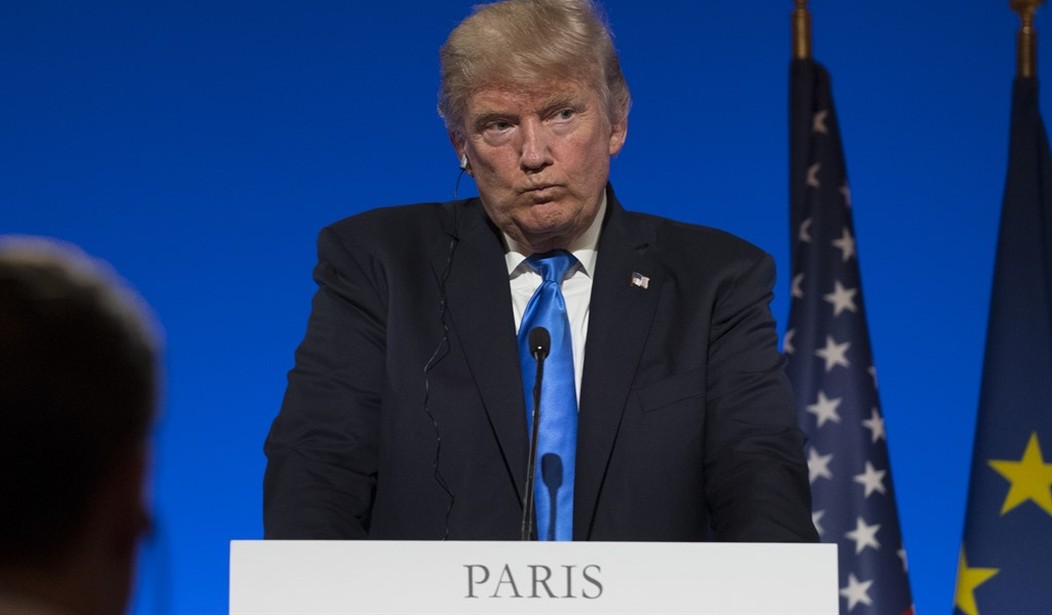Now here’s an interesting result. Three presidents, three metrics — and in each case the biggest problem for each man was different than it was for the other two.
The silver lining for Trump is that, for all the criticism he draws in the media about pushing bad policy or doing a poor job as president, that’s not what sticks out to his critics. Overwhelmingly anti-Trumpers are anti mainly because they disdain Trump the man, not Trump the ideologue or Trump the C-in-C.

For definitional purposes, “personality” includes things like “not presidential/bad temperament/arrogant/obnoxious” and “inexperienced/doesn’t know what he is doing” while “broad performance evaluations” encompasses “disagree with what he is doing/doing a poor job” and “not fulfilling his campaign promises/all talk and no action.” (“Issues/specific policies” is self-explanatory.) For anti-Obamaites in 2009, it wasn’t personality but policy that drove most objections. And for Dubya in 2001, it was neither. Rather, it seems, most anti-Bushies basically just thought he was doing a poor job of leadership.
How much of that split is circumstantial and how much is essential? For instance, it’s no surprise that most of the backlash to Obama at this point eight years ago was driven by policy. The guy had just rammed through the stimulus in response to the financial crisis and was eyeing a massive leftist overhaul of the health-insurance industry. If you were a right-wing Obama critic, obviously it was the “transformational” potential of Obama’s presidency while he had a filibuster-proof majority in the Senate — health care, guns, immigration, you name it — that kept you up at night. The first six months of Bush’s presidency were mostly uneventful by contrast, blunting any strong objections to him on policy grounds. Dubya also had an easy charm that kept non-ideologues on his side personally, at least until the darker days of Katrina and the Iraq War. Objecting to him on “broad performance” may have been the most popular criticism of him by default. Trump, on the other hand, is the guy responsible for the “Access Hollywood” tape, who once goofed on John McCain for getting captured by the VC, who answers questions about Putin murdering journalists by reminding people that America does bad stuff too, who still attacks critics personally on Twitter, and on and on. And Trump is larger than life as a personality, possibly the most ubiquitous human being who’s ever lived at this particular moment in time in this particular media culture. He was a tabloid curiosity turned national celebrity turned TV star turned president. It’d be weird if his detractors didn’t react to his personality first and foremost given how much the Trump persona defines every political question now.
Also, how does one assess Trump on policy? Which policy? The guy’s a globalist or a nationalist, a hawk or a dove, depending on which advisors were the last to speak to him on a given day. As far as I can tell, he’ll sign pretty much anything Ryan and McConnell hand him on health care in the interest of just getting the damned issue off the table already.
There’s another wrinkle, though. If I understand the poll correctly, Gallup’s asking people to pick which of the three metrics most explains their objections to the president. That is, it’s not necessarily that anti-Obamaites thought he was doing a good job on “broad performance” in 2009. It’s that, forced to choose between “broad performance” and policy as the subject that worried them most, they chose policy, understandably. Applying that logic to Trump, we should be careful about concluding from this that Americans are mostly comfortable with him on policy and “broad performance” just because so many choose personality when asked what they dislike. Personality is the standout objection but possibly not the only objection. It may be (and probably is) that Trump-haters would also uniformly give him poor marks on “performance.” It’s just not the first thing that jumps to mind when they’re asked, “What’s your problem with Trump?”
By the way, the quirk in different reasons for disapproving of each president didn’t repeat when Gallup asked people why they approved of them. For each of the last three presidents, the main reason given for approving of them was “broad performance.” Interestingly, though, Trump’s approval was divided more evenly among the three categories than was Obama’s or Bush’s. For Bush the performance/policy/personality split was 50/9/24. For Obama it was 41/40/15. For Trump it’s 38/33/24. The pro-Trump view of that is that the current president has more facets to his appeal than the previous two did, which may explain how he built a winning coalition. Some like his populism, some like his leadership, some like that he’s a plain-spoken “fighter.” The anti-Trump view is that even many Trump fans don’t think his performance thus far is all that good, so they’re forced to opt for one of the two other categories. It’s interesting to me that the share who say they approve of his personality is only equal to Dubya’s share even though, as I said, Trump’s persona looms so largely over his presidency. Maybe that’s a subtle judgment even by some fans who otherwise like him that the combative Twitter squabbling is a little out of control right now.








Join the conversation as a VIP Member